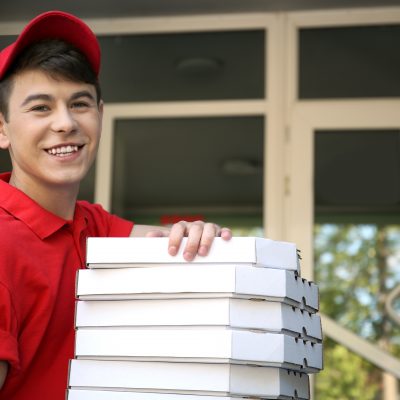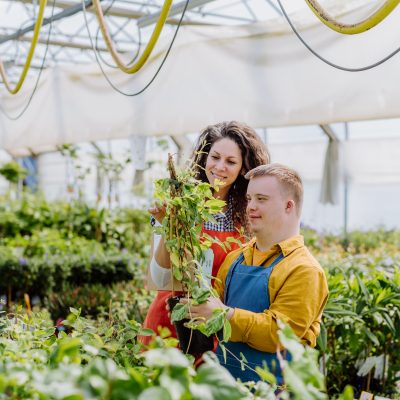How jobs shape us: taking a look back at BCEC staff’s first jobs

Employment is at the forefront of all of our minds at the moment – with COVID-19 highlighting just how important a job is in all our lives. With this in mind, BCEC staff recently sat down together and reminisced about their first jobs; what they were, what they meant to them and what they learned from them.
Rebecca Cassells, Head of Impact and Engagement
What was your first job?
My first job was a paper run in the small town I grew up in. I was about 11 at the time and sub-contracted by my older brother to deliver papers to the houses on our side of town. The houses that I had to deliver to were spread out and generally on the edges of the town, down little dirt lanes and bordering farmland. Now that I think about it, they were typically the more affluent homes – not that it really occurred to me at the time. I didn’t like getting up early, especially if it was frosty or raining, but once I was out and about it was nice to be up that early and I had my dog for company.
What did it mean to you?
The job meant I had my own money to spend on myself, and it gave me a sense of independence and freedom.
What did you learn from it?
Apart from how to avoid magpies and deal with dogs (pedal fast), it taught me some important lessons. Time management was one, as I had to be back in time to get ready for school. I also had to be responsible with the papers, make sure they were in good condition and delivered to the right property. If it was raining, I had to keep them dry and throw them on people’s verandas to make sure they stayed dry – there was no plastic wrap in those days.It also taught me how to negotiate wages, especially as I wasn’t contracted directly by the newsagent – I’m not even sure if he knew. If I wasn’t feeling particularly energetic, or if it was freezing or raining, I’d ask for a wage loading.
Steven Bond-Smith, Research Fellow

What was your first job?
I had three first jobs: (i) Kitchen hand at a local café; (ii) Carer at a primary school holiday program and (iii) Painter for my parent’s house. When I finished school I took on a few jobs for the summer before I went to Uni. My friend worked as a kitchen hand at a café and they were just starting to open evenings, so I asked and got three evening shifts a week (Thurs-Sat) washing dishes, making fries, making iced chocolate and prepping side salads. I also asked at the primary school if they needed helpers on the school holiday program. I was hired 2 days a week till 3pm for the days they did field trips and required extra helpers. We went to the beach, movies, mini-golf, swimming pools etc., but I also stayed longer hours voluntarily because it was loads of fun. This helped too because in later term holidays, if they coincided with University breaks, I was offered full weeks of work, and the pay was double my café rate, so it was a great casual job that was both well-paid and fun. And my parent’s house needed repainting so they offered to pay me to do it when I wasn’t working elsewhere, instead of hiring a painter.
What did it mean to you?
Independence. It was great to have money, but I saved that. I was independent because I was pursuing my own thing.
What did you learn from it?
I learnt a lot of little things. The kitchen hand gig was slow. They didn’t get many people in the evenings because the café was in an industrial area that was busy for lunch, but not for dinner. I learnt about making food look good on the plate and still try to do that when I cook now. And I learnt l to get stuck in to cleaning dishes: my Dad was very impressed and surprised when he asked me to clean the BBQ and I got stuck in. At the kids holiday program I learnt that kids have unbelievable energy. My whole body ached. I was the only male and the kids insisted I lead the outdoor games which were very intense. I got very fit. I was not a good painter. I learnt how I was supposed to avoid brush strokes in the paint, but I was still too slow and it wasn’t a great finish. I learnt how to make “builder’s bog” to fill in the cracks in the weatherboards. I also quickly grasped that rain was bad for wet paint, so “it looks like it might rain” became a good excuse to go surfing instead – I remember it being an abnormally wet summer.
Caroline Stewart, Events and Communications Coordinator

What was your first job?
My first job was working at Blockbuster Video. I started working there when I was 16 and in high school and I worked there all through the rest of high school and university. It was actually the perfect first job for me – I’ve always been a bit of a movie buff and I loved working there. I got to watch movies all day, take home tapes for free, watch preview tapes of upcoming movies and I got to talk about movies all the time with other movie buffs. It was also great because I could work shifts around my uni schedule, and study around my weekend and night shifts.
What did it mean to you?
Jobs are in part about independence right? As a 16 year old making money for the first time, I really felt that. To have a little bit of financial independence and freedom was great – and I could spend my money how and on what I wanted. That being said I was actually really responsible with my money for a 16 year old!
What did you learn from it?
This job was probably my first experience of adult responsibilities, so I guess it gave me a taste of what it was like to have those responsibilities – having time commitments and being accountable in a work environment. It also taught me a lot about customer service and dealing with people. When you work retail you have to deal with a lot of difficult people (some of the most difficult customer interactions while I was working at Blockbuster included being threatened, abused, harassed and yelled at a lot). I learnt a lot about how to deal with difficult situations and people because of this. It wasn’t all bad of course, and there were some customers I absolutely loved – and I guess that’s also what I took away – that it doesn’t take a lot to make or break someone’s day, so always be kind and considerate to people working in customer service!!
Astghik Mavisakalyan, Principal Research Fellow

What was your first job?
My first job was working as a journalist in one of Armenia’s then core news agencies, Noyan Tapan. I started the job when I was 17 and continued through most of my years at university. First, I worked as a translator, creating Armenian-language news items based on English or Russian news articles supplied by various foreign agencies. At some point, I was ready to work in the field, attending press conferences in government agencies, and doing my own interviews, writing occasional op-eds, etc. It was extremely unusual in those time in Armenia to start working at such young age, and especially in a high-skilled occupation (I was by far the youngest member of the agency), and I was feeling really proud about it!
What did it mean to you?
It was a very exciting job, a lot was happening in mid-late 90s in Armenia’s economic and political life and it was great to be part of some of these developments. I actually believed that I could make a difference in the society through this job, and was extremely driven by it. My job satisfaction was very high, I couldn’t have wished for more at the time. I was doing my first economics degree at the same time, and wasn’t particularly into it then. But I was drawing on my developing economics knowledge to do my work as a journalist and in a way, this was helping me to stay motivated about the degree. These were economically challenging times, and I was able to tangibly contribute to our family budget, which was great.
What did you learn from it?
I got a huge amount of knowledge and skills from this job, that I still use to date. I was fortunate to work under the supervision of an extremely talented editor, Harutyun Khachatryan, who guided and mentored me through the process. I had wonderful colleagues who were very passionate about the profession, as a lot of journalists are, and served as amazing role models. I learnt how to write properly and efficiently, to identify important topics, to pick up important content, to come up with good questions. My English skills improved a lot through this job, as did some of my non-cognitive skills, such as confidence and courage.
Maria Sandoval-Guzman, BCEC-WiSER PhD Scholar

What was your first job?
My first job was as a cashier at a department store during my sophomore year at uni. However, my most meaningful lessons about work happened many years before, in my honorary position as my grandfather’s agave-counting sidekick. My hometown is one of the largest tequila producers. Tequila, just like scotch or champagne, has a protected designation of origin, and can only be produced with one type of agave in a limited area of Mexico. As economics goes, if you have increasing demand and the agave takes anywhere from 7 to 12 years to grow, you need to carefully plan your supply, and so there is a regulatory council which tracks the number and age of agave plants each producer has in their land. And so we had to count them! Looking back, I realise there was no real change from week to week, and so it is likely my grandfather knew how much I liked doing it and would just assign me different rows to (re)count each time.
What did it mean to you?
Spending the weekend at the farm was one of my favourite activities as a child. I loved the expansiveness of the blue sky against the red soil (just like Australia’s), the sound of the cicadas and the fresh air. We would feed the cows and that was an adventure. I also got to help plant corn and beans. It instilled in me a lot of respect for the non-stop work that rural life entails, the pride of a job well done.
What did you learn from it?
I learned a lot about the interdependency between economic activity and environmental sustainability, eventually leading to some of my first achievements as a young economist. It was precisely with a case study of the tequila industry –and the role knowledge can play in poverty reduction and environmental conservation– that I won an award by the World Bank Mexico; later on, it informed my work in the areas of sustainable development and jobs and growth.
Daniel Kiely, Senior Research Fellow

What was your first job?
My first job was working in the yard of a local hardware store. I started at aged 15 and worked there during the summer months for four years. Tasks varied from loading bags of cement and timber onto car trailers by hand, using a kango hammer to drill holes in concrete pipes, stocktaking, invoicing and painting the roofs of the storage sheds! On occasion I got to go offsite in the delivery van. These ‘out of the office’ days were my favourite part of the job!
What did it mean to you?
There were not a lot of job opportunities for younger people in a small rural village in Ireland. So, I was very grateful for the opportunity. It was a small family run business, and was a central part of the community – a critical point of contact for the local agricultural and construction community. I loved this sense of belonging and having a meaningful role in society. Given that my sister and brother worked at the same store before me, my greatest achievement was negotiating a half day on a Saturday and a 10 pound (before Ireland went to euro!) increase in salary – a 20% pay increase at the time! I clearly knew little about minimum wage rights at the time!. But, this achievement gave me wonderful bragging rights at home and caused a lot of envy from my siblings. I was very proud of myself! My parents thought I would become a union rep or politician! The money I earned funded going to the discos on a Wednesday and Saturday night!
What did you learn from it?
In addition to learning how to drive a forklift that had no breaks (yes! – switching from reverse to neutral was the break!), I learnt the importance of networks, relationships and honesty. Studying labour economics later in life highlighted the importance of networks in gaining employment. The soft skills from a part-time summer job are 100% transferable to other organisations, irrespective of the hard skills required. You will meet similar people and behaviours (good and bad) in all avenues of life. It is important to treat your staff, customers and suppliers with respect and dignity, particularly when mistakes occur. Other lessons include appreciating the value of money and the level of independence and pride you gain from engaging in work. I remember cycling home from work on my first pay day (cash!), and buying all my family members a bar of chocolate! Still brings a smile to my face!
Silvia Salazar, Research Fellow

What was your first job?
My first job was working as a waitress in a Serbian restaurant in London. After finishing my high school degree in Colombia, I went to London to improve my English. I had English lessons in the morning and in the afternoon I worked as a waitress in a Serbian restaurant that was mostly a café/breakfast place but also served some Serbian dishes. I remembered thinking: “British can eat breakfast food at any time of the day! How weird”. I also realized how much tea can English people drink, this was quite interesting to me that was born on a coffee paradise land, where nobody drinks tea!
What did it mean to you?
I guess it meant a lot of changes for me. I was 17, in a foreign country having to make a living. It made me grow pretty fast; all the sudden I was independent! I had to go to classes, work, find a place to live. It felt like a great adventure! I also realized the multiculturalism of London where a Serbian restaurant served English food with a Polish/Italian/Colombian staff. It was very new to me, especially because there were very few foreigners in Colombia at that time but there you had all these people from around the world working in a tiny restaurant. I still love Serbian food, especially the Pasulj.
What did you learn from it?
Mostly that I am really bad at waitressing. My hands are too tiny to hold things and I’m also pretty clumsy. It was such a different experience because all the other waitresses were so much better at their job than me and before that I had just been at the school where I had excellent grades and I was very good. So it made me understand that you can’t be good at everything, some things you might never be good at. That was a difficult and humble lesson to learn; sometimes you might not have the ability to accomplish what you want and you might have to work much harder than everybody else to achieve the same outcome.
Mike Dockery, Principal Research Fellow
 What was your first job?
What was your first job?
I had a paper round selling the Sunday Independent (only our older Perth cohort will remember it). I think I was 12 or 13.
What did it mean to you?
A bit of extra money to save up for records (those vinyl things), going to movies and so on. We got 5c for every paper sold, and a 25c bonus for each lot of 25 (plus we got to keep the 2-for-1 burger vouchers from the unsold papers.)
What did you learn from it?
In some jobs, it’s only the tips that make it worthwhile. After doing the round of houses, we’d sometimes try our luck selling at the traffic lights. Fumbling with the change as the lights turn green was always a well-worn trick. The post-election and post grandfinal Sundays were always bumper days. In those times, most people were much more interested in the back page headlines that the front page headline – I wonder if that has changed?




